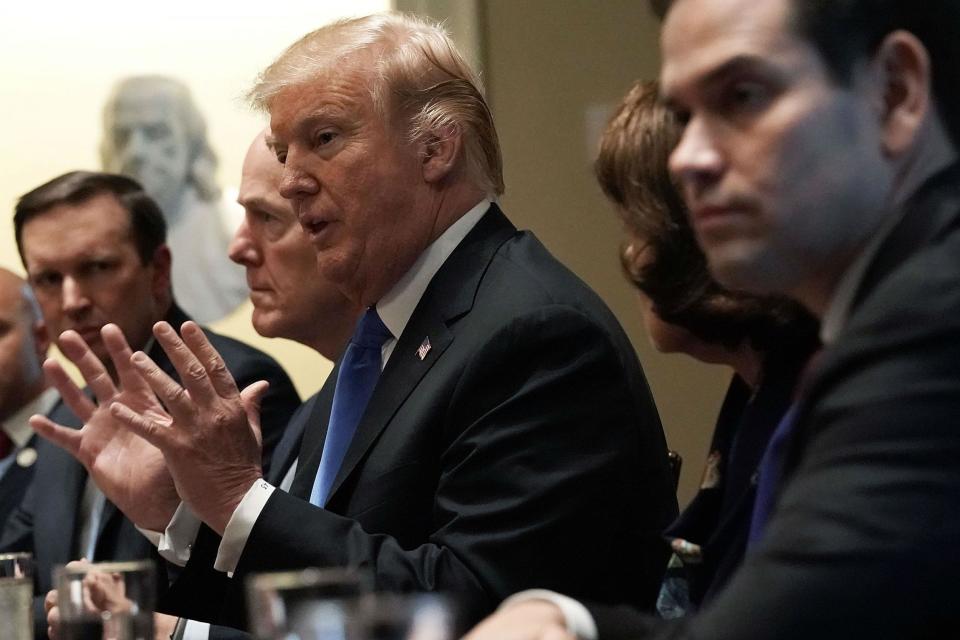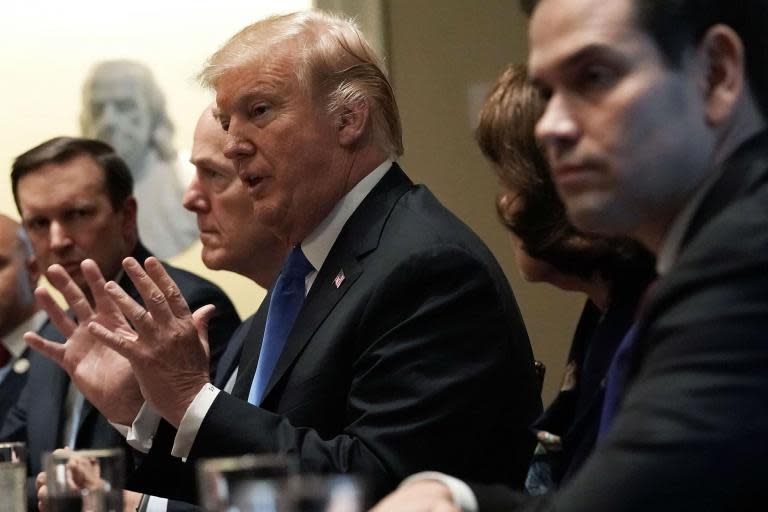Trump has mightily annoyed his base over guns, but it could be the making of him
In the fourteen months Donald Trump has occupied the Oval Office, he has frequently acted in a way that has left many in the Republican Party horrified. He has taken positions on trade and foreign policy, Russia and protectionism, that have represented the stark opposite of GOP orthodoxy.
All the while, this veteran of reality television has never failed to put on a good show. Depending on ones perspective, that show has been in the form of a political lion shaking up the Washington establishment, or a impulsive and praise-hungry narcissist, overseeing a chaotic circus.
At the White House this week, Trump managed combine the two, putting on a blockbuster of a show and angering Republicans, as he sought the political equivalent of having his cake and consuming it, with comments on gun control.
this @BenSasse statement on the White House meeting on guns is an on the record, profanity-free version of what many GOP aides have been e-mailing/texting in the last few hours: pic.twitter.com/g2r5RnltVV
— Phil Mattingly (@Phil_Mattingly) February 28, 2018
Meeting with governors and members of Congress, the 71-year-old voiced a series of ideas on gun regulation that were at odds with many in his party. He also told the politicians they should not be afraid of the powerful National Rifle Association, the lobbying organisation that spent $30m helping elect him.
“I am the biggest fan of the Second Amendment. I am a big fan of the NRA. I had lunch with [them] on Sunday and I said, ‘It’s time, we’re gonna stop this nonsense this time’,” Trump said.
“[The NRA] has great power. They have great power over you people. They have less power over me. I don’t need it. What do I need? But I’ll tell you, they are well-meaning…We have to do what is right.”
He also angered many, when, speaking over Vice President Mike Pence, who had been talking about allowing local authorities to remove weapons with due process, from people who were mentally ill, Trump suggested grabbing the guns first and asking questions later.
“Or, Mike, take the firearms first, and then go to court. Because that’s another system, because a lot of times, by the time you go to court, it takes so long to go to court to get the due process procedures,” he said. “I like taking the guns early, like in this crazy man’s case that just took place in Florida.”
As Democrats at the meeting smiled broadly, many conservatives turned on Trump and accused him of “betrayal”.
“The insanity of Trump mouth-farting on national TV about removing guns from citizens without due process is surpassed only by Democrats’ excitement at the possibility of actual Trumpian authoritarianism,” said right wing commentator Ben Shapiro.
During the election campaign, Trump positioned himself as a strong defender of the Second Amendment and claimed, incorrectly, that his rival Hillary Clinton, had a plan to take away people’s weapons. As a result, his comment in support of removing somebody’s gun, even from somebody suffering from mental illness, with going thought the correct legal procedure, will be have been received with horror by many.
Republican Senator Ben Sasse of Nebraska, a frequent critic of Trump, was among them. He said: “Strong leaders don’t automatically agree with the last thing that was said to them. We have the Second Amendment and due process of law for a reason.”
In the two weeks since 17 students and teachers were killed, and many of those who survived have led a national campaign pushing for reform of the US’s gun laws, Trump has vowed to act. A week ago, he met with students, teachers and residents of Parkland at the White House, for a similar session to make swap suggestions and ideas.
It seems Trump senses the public outrage following the shooting and the passionate, eloquent demands from the survivors. He may also be aware a large majority of Americans – if not necessarily his core supporters – support changes to gun regulations.
A poll last November by Quinnipiac University, found 94 per cent of Americans believed in background checks for all gun purchases, 79 per cent believed there should be a mandatory waiting period for purchases, 64 per cent supported banning assault-style weapons and 64 per cent supported banning the sale of magazines that carry more than 10 rounds.
It is notable the measures Trump has supported – increasing the age requirement for purchasing a rifle, better background checks, more help for the mentally ill and banning bump stocks, a device that allows someone to fire a rifle as if it were a fully automatic weapon - have the widest support and would cost him the least political capital.
Likewise, he has not came out in favour of universal background checks, banning the sale of assault style weapons or limiting the number of bullets a magazine can carry.
During the meeting, which also included prominent Democrats, Trump told House Majority Whip Steve Scalise, who was gravely injured in a mass shooting last summer, the comprehensive gun bill he was seeking would not pass if it included a concealed carry reciprocity proposal desired by Republicans.
It’s funny how all the GOPs at gun mtg (except Rubio) obviously know all about guns, while the Dems may as well be talking about cold fusion.
— Ann Coulter (@AnnCoulter) February 28, 2018
Yet he told him he still supported the measure. “I’m your biggest fan in the whole world,” Trump told Scalise. “I think that bill maybe one day will pass, but it should pass as a separate.”
The President is clearly trying to have it both ways. And in a world in which all politics is local, that might just work and he and the Republicans may pick up enough new voters to make up for any they lose.
A case in point is the special election campaign currency underway in Pennsylvania’s 18th District, which Trump won by 20 points in 2016. In a break with his party’s usual platform, the Democratic candidate, Connor Lamb, who is challenging Republican Rick Saccone, has made headlines by saying he does not support further gun regulations.
“I believe we have a pretty good law on the books and it says on paper that there are a lot of people who should never get guns in their hands,” he told reporters.
There is nothing to stop Republicans doing the same in the November midterms. In the red or conservative states, candidates can portray Trump as a man who stood up for gun rights and who demanded better care for people with mental health.
In purple states such as Florida, and in states won by Clinton, candidates can underscore his backing for better background checks and increasing age limits. Candidates can point out Trump invited everyone to the White House and listened to their ideas.
That is called politics.


